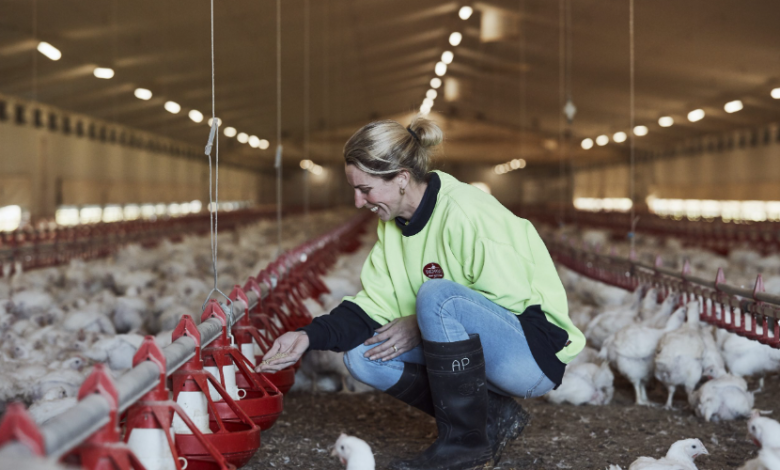LMIA Approved Jobs for Poultry Workers in Canada – APPLY NOW

Have you ever considered a career working with poultry in Canada? The industry offers a diverse range of opportunities, and for qualified individuals from abroad, the Labour Market Impact Assessment (LMIA) program can open the door to exciting possibilities. This program bridges the gap between employers facing labor shortages and skilled foreign workers seeking a new chapter in Canada.
This guide helps you to look into the world of LMIA approved poultry jobs for workers in Canada. We’ll explore the LMIA process, highlight potential job roles, and offer tips on finding these opportunities. So, if you’re interested in contributing to Canada’s thriving poultry industry, keep reading!
LMIA Approved Jobs for Poultry Workers in Canada
The Canadian poultry industry offers a variety of employment opportunities, and under specific circumstances, some of these positions can be filled through the Labour Market Impact Assessment (LMIA) program. This program allows employers to hire foreign workers when they can demonstrate a demonstrable inability to recruit qualified Canadian citizens or permanent residents.
Here’s a breakdown of LMIA and Poultry Worker opportunities in Canada:
Understanding LMIA for Poultry Workers in Canada
The Canadian poultry industry is a significant economic driver, and it relies on a skilled workforce to keep things running smoothly. However, like many industries, it can face labor shortages. This is where the Labour Market Impact Assessment (LMIA) program comes into play for foreign workers seeking opportunities in poultry production.
What is LMIA?
LMIA is a process established by the Employment and Social Development Canada (ESDC) to ensure that employers genuinely try to recruit qualified Canadians before hiring foreign workers under the Temporary Foreign Worker Program (TFWP). It’s essentially a way to assess the labor market impact of hiring foreign workers.
How Does LMIA Apply to Poultry Workers?
For poultry farms and processing plants facing genuine labor shortages, LMIA can be a valuable tool. Here’s how it works:
- Employer Responsibilities: The employer must demonstrate a good faith effort to recruit Canadian workers. This involves advertising the positions, potentially adjusting wages or working conditions to be more competitive, and documenting their recruitment efforts.
- LMIA Application: Once the employer has proven their efforts to recruit Canadians, they can apply for LMIA approval. The application details the specific job requirements, wages offered, and why qualified Canadians couldn’t be found.
- Government Review: The ESDC reviews the application to ensure it meets all the requirements and that hiring foreign workers won’t negatively affect Canadian workers’ wages and working conditions.
Types of LMIA Approved Poultry Jobs
Poultry farms and processing plants offer a variety of positions that might be eligible for LMIA approval, depending on the specific needs of the employer and the demonstrated labor shortage. Here’s a deeper dive into some potential poultry jobs with estimated wage ranges (please note these are approximations and can vary depending on experience, location, and specific employer):
Poultry Farm Workers:
- Responsibilities: These workers are the backbone of poultry farm operations. Their responsibilities can include:
- Feeding and watering birds
- Maintaining and cleaning poultry houses
- Monitoring bird health and reporting any issues
- Collecting eggs
- Assisting with vaccinations and other animal care procedures
- Potentially assisting with slaughtering operations (depending on farm size and setup)
- Salary: Poultry farm worker salaries can vary depending on experience and the type of poultry operation (broilers, layers, etc.). Entry-level positions might start around $15-$18 per hour, with experienced workers potentially earning $20-$25 per hour. Salaries can also be supplemented by benefits packages.
Poultry Processing Plant Workers:
- Responsibilities: Processing plants handle the transformation of live poultry into consumer products. Workers in these facilities might perform tasks like:
- Slaughtering and defeathering birds
- Eviscerating (removing organs) and cleaning carcasses
- Cutting poultry into various parts
- Packaging poultry products
- Maintaining sanitation and hygiene standards throughout the processing line
- Salary: Processing plant workers typically earn wages similar to farm workers, with a range of $15-$20 per hour for entry-level positions. Experienced workers and those in specialized roles (e.g., butchers) might command higher salaries, potentially reaching $22-$28 per hour.
Specialized Poultry Workers:
- Responsibilities: Beyond general farm and processing roles, the poultry industry also requires specialized positions. These might include:
- Hatchery Technicians: Overseeing egg incubation, monitoring chick development, and ensuring proper chick health in hatcheries.
- Poultry Equipment Operators: Maintaining and operating specialized machinery used in processing plants.
- Poultry Inspectors: Ensuring poultry products meet safety and quality standards during processing.
- Salary: Specialized poultry workers often require additional training or certifications. This can be reflected in higher wages, with a range of $20-$25 per hour for entry-level positions and potentially reaching $30+ per hour for experienced workers with specific skillsets.
Important Note: These wage ranges are estimates and should be used for informational purposes only. It’s crucial to research specific job postings and employers to get the most accurate salary information.
By understanding the types of LMIA approved poultry jobs and their associated wage ranges, skilled foreign workers can make informed decisions about potential career paths in the poultry sector in Canada.
Eligibility Requirements for LMIA Approved Jobs for Poultry Workers in Canada
Eligibility for LMIA-approved poultry worker jobs in Canada involves a two-pronged approach:
1. Employer Requirements:
- Genuine Labor Shortage: The employer needs to demonstrate a documented and demonstrable effort to recruit qualified Canadian citizens or permanent residents for the position. This might involve advertising the job opening on various platforms, potentially adjusting wages or working conditions to be more competitive, and keeping detailed records of their recruitment efforts.
2. Foreign Worker Eligibility:
There are no specific citizenship requirements for LMIA-approved jobs. However, foreign workers generally need to meet the following criteria:
- Relevant Skills and Experience: This is crucial to convince the employer and potentially the government that you possess the necessary skills to perform the job effectively. Experience in poultry farming, processing, or related fields is highly desirable.
- Education and Qualifications: While specific educational requirements might vary depending on the job (e.g., hatchery technician might require specialized training), some level of education or relevant certifications can strengthen your application.
- Language Skills: Proficiency in English or French (or ideally both) is often essential for effective communication in the workplace and daily life in Canada.
- Ability to Meet Immigration Requirements: Once LMIA approval is secured, foreign workers need to undergo the separate process of obtaining a work permit. This might involve meeting medical examination requirements, submitting background checks, and paying processing fees.
Important Note: Immigration regulations and requirements can change. It’s always best to consult with an immigration specialist who can provide the most up-to-date guidance on eligibility for LMIA-approved poultry worker jobs in Canada.
Benefits of LMIA for Poultry Workers
For skilled foreign workers seeking opportunities in Canada’s poultry industry, the Labour Market Impact Assessment (LMIA) program offers more than just a streamlined work permit process. LMIA approval unlocks a doorway to a variety of potential benefits that can contribute to a rewarding career and a fulfilling life in Canada. Let’s delve deeper into these advantages:
1. Employment Security and Stability:
- Peace of Mind: LMIA approval signifies that the employer has demonstrated a genuine need for your skills and has been unable to find qualified Canadians. This translates to a reduced risk of job displacement and provides a greater sense of security in your employment status.
- Employer Sponsorship: In some instances, LMIA approval can be the first step towards employer sponsorship for permanent residency. This paves the way for a long-term future in Canada, allowing you to build a life and career without the limitations of a temporary work permit.
2. Career Development and Advancement:
- Access to Training: Forward-thinking poultry employers might offer skills development programs or provide financial assistance for relevant certifications. With LMIA approval, you’re more likely to be considered for these opportunities, helping you enhance your skillset and potentially move into more specialized or supervisory roles within the industry.
- Networking Opportunities: Working legally within the poultry industry allows you to build professional relationships with colleagues and supervisors. This network can prove invaluable for future career advancement or even transitioning to different poultry companies in Canada.
3. Improved Working Conditions and Potential for Growth:
- Standardized Wages and Benefits: LMIA approval helps ensure that you’re offered wages and benefits that meet the prevailing standards in the Canadian poultry industry. This reduces the risk of exploitation and provides a more predictable income stream.
- Pathway to Leadership: The Canadian poultry industry is constantly evolving, and with LMIA approval and relevant experience, you could position yourself for leadership roles within your company. This could involve supervising teams, managing operations, or even contributing to decision-making processes.
4. Integration into Canadian Society:
- Financial Security: Stable employment with a fair wage allows you to contribute to the Canadian economy and achieve financial independence. This financial security can empower you to establish yourself in Canada, potentially sponsoring family members for immigration in the future.
- Community Involvement: With secure employment and a sense of belonging, you’re more likely to become involved in your local community. This fosters social connections, cultural exchange, and a deeper sense of integration into Canadian society.
While LMIA offers significant benefits, it’s important to do your research and choose reputable employers who value their workers. Consulting with immigration specialists can also be helpful to understand the full picture of LMIA’s role in your potential pathway to permanent residency in Canada.
Conclusion
Understanding the LMIA process is crucial for foreign workers interested in poultry jobs in Canada. By showcasing relevant skills and experience, along with potentially seeking guidance from immigration consultants, you can increase your chances of finding success in this growing industry.



